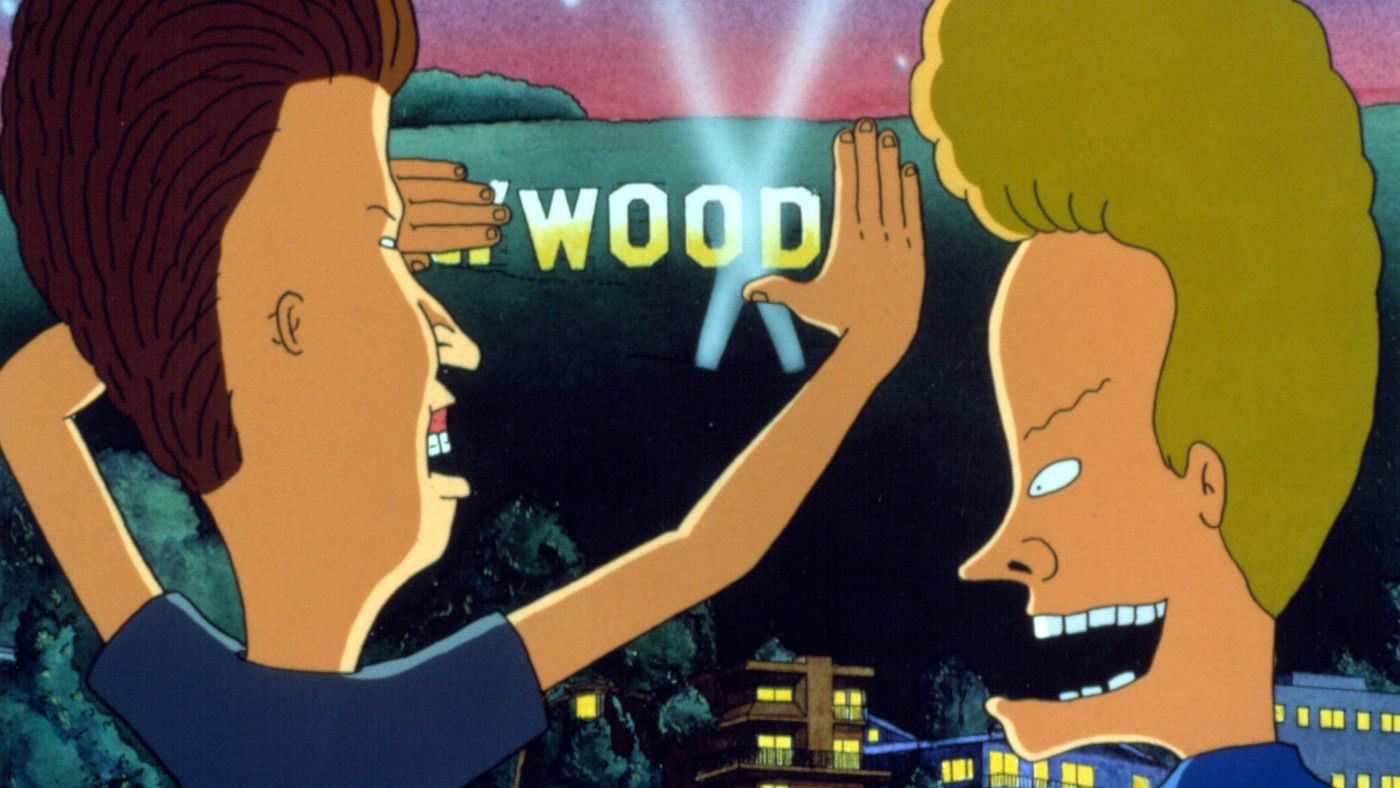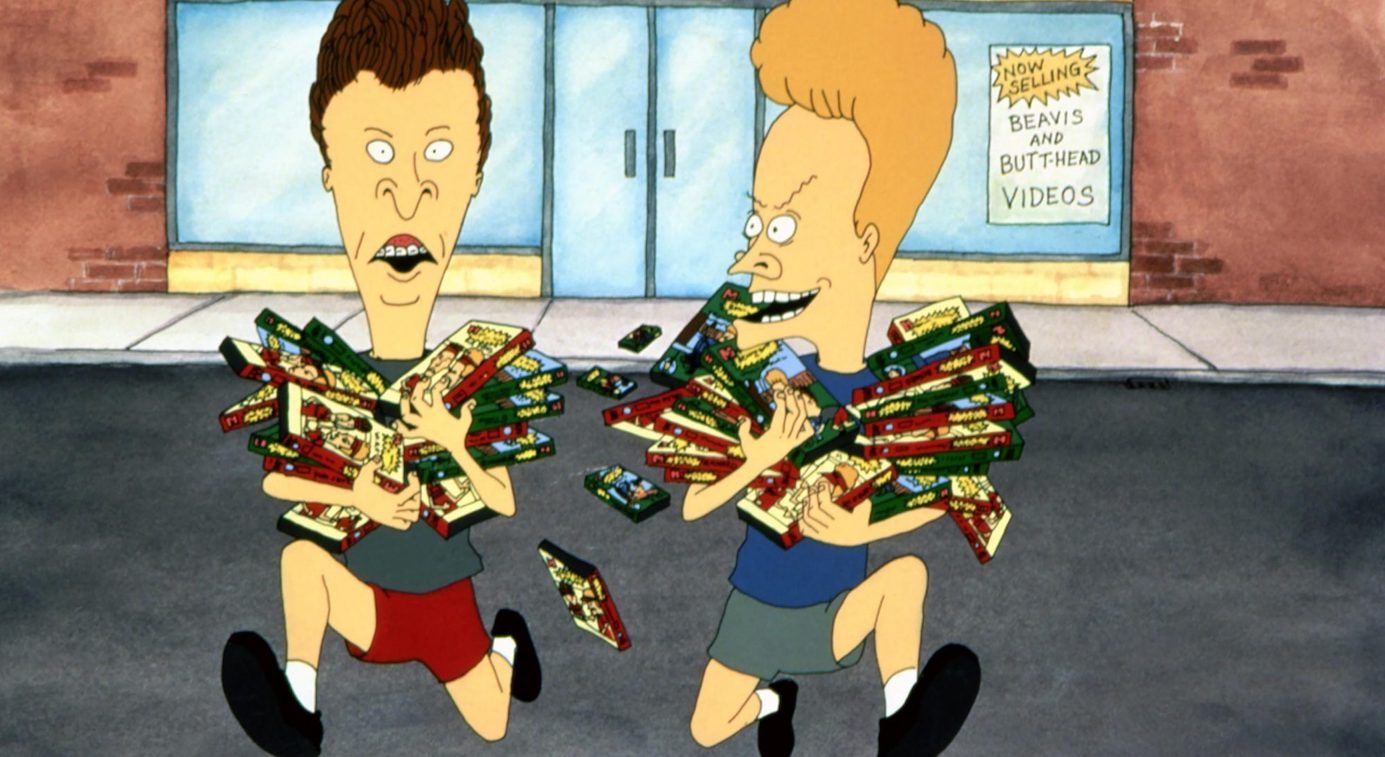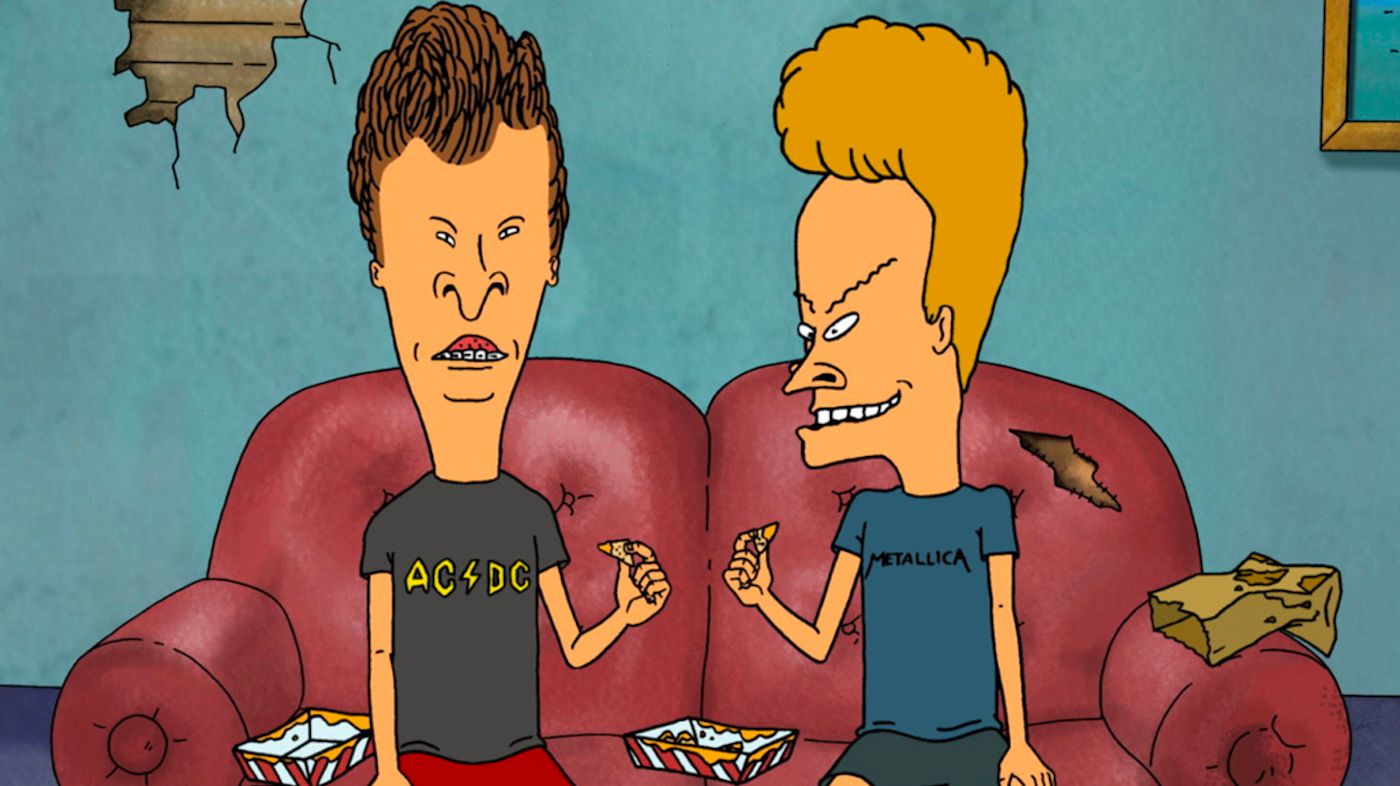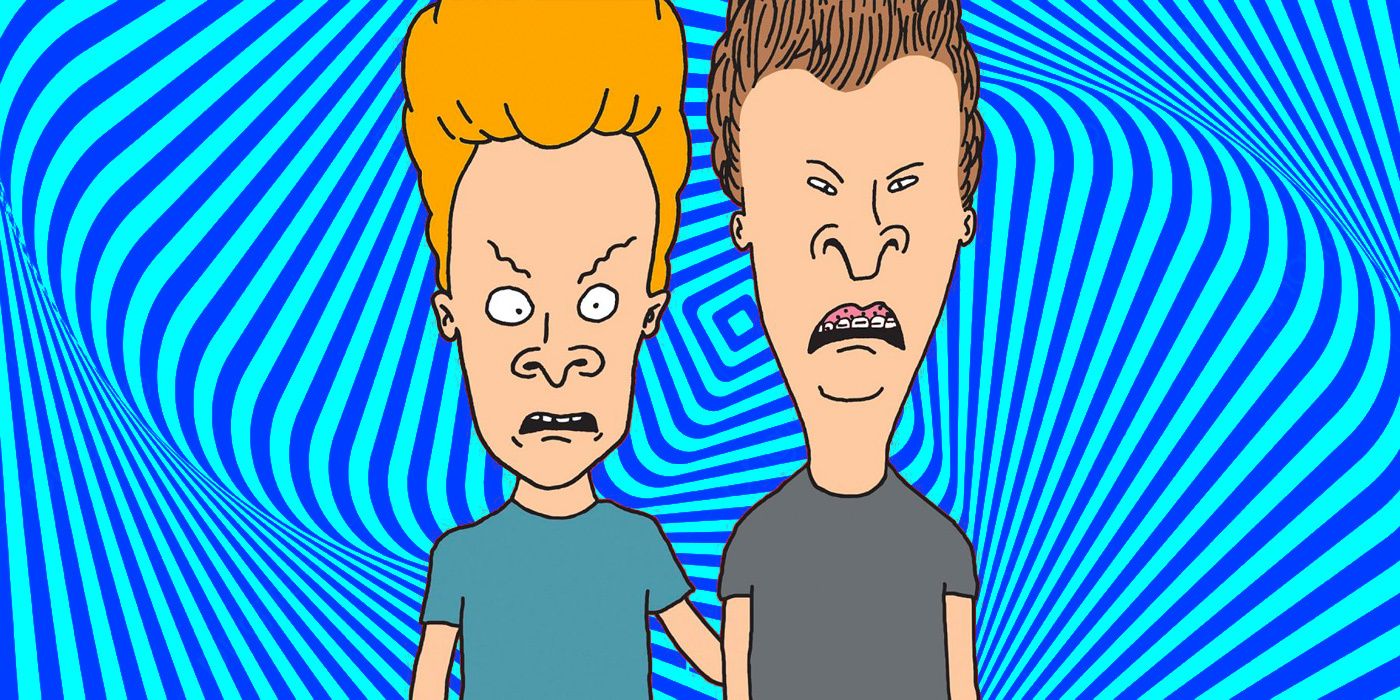Why Is Beavis and Butthead Funny
The Understated Satire of 'Beavis and Butt-Head'
"Uh, huh-huh-huh."
That laugh. If you hear it once, you'll never forget it. And chances are, you too will be reduced to laughing at the moronic puns ("Huh. You said 'wood.'") and the general mayhem of Beavis and Butt-Head . Two of the most ubiquitous slackers and miscreants in the animated realm, high-schoolers Beavis and Butt-Head spend an average episode of their self-titled show conducting their favorite pastimes of breaking stuff or trying (and failing) to pick up chicks.
Take the early episode "Home Improvement," which begins with a simple premise of the boys offering to paint their neighbor, Mr. Anderson's, trim. Quickly, they get high on paint thinner, paint Mr. Anderson's cat, start a fire and steal away on Anderson's lawnmower. Or the episode "Comedians," where Beavis's nightclub act of juggling matches results in the obvious: the comedy club burning to the ground. This episode actually became infamous because of widespread media reports that attributed the cause of the tragic case of Austin Messner to the moronic teens -- a five-year-old Ohio boy who burned down his family's trailer home with a cigarette lighter, resulting in the death of his two-year-old sister. Other episodes incurred controversy in the wake of seeming copycat actions; "Ball Breakers," which sees Beavis and Butt-Head lace a bowling ball with explosives and drop it from a roof, was repudiated by media watchdog groups following the tragic death of Natalia Rivera, who died after being struck by a bowling ball dropped from an overpass by 18-year-old Calvin Settle. It was later determined by prosecutors that Settle had never watched the show. But by that point, the show had been painted as a danger, a palpable menace to society, affecting its production (Beavis could no longer shout "Fire!," his heretofore catchphrase) and reruns (several episodes were pulled for good). The show even emerged on the floor of the U.S. Senate, cited by Senator Fritz Hollings as an example of television broadcasters being too lax in curbing their violent content.
Provoking violence and destruction may be the boys' hobby of choice, but the oft-repeated claim that the show promoted the calamitous mayhem its characters engaged in cannot be further from the truth. Beavis and Butt-Head packs a great deal of satire in its crudely animated shots of animalistic behavior and indifferent destruction. For one, Beavis and Butt-Head simply don't know any better. They are (likely) the products of a broken home -- or rather a non-existent one; their parents are never seen and are mentioned only sparingly in the series (usually in the form of jokes at Beavis's mother's promiscuous ways). Additionally, Beavis and Butt-Head serve as indictments of a flawed education system that focuses on promotion to the next level rather than ensuring one's progress. The Season 5 episode "Held Back" provides perhaps the best illustration of this. In a reverse- Billy Madison , the boys are regressively sent to the grade below them; once they reach kindergarten and are found to be obnoxious distractions to even their 5-year-old peers, the school simply puts the boys back to 9th grade and forces Highland High School to take them back. Of course, you can't really blame the school. Beavis and Butt-Head have demonstrated time and time again that they will not learn their lesson. These are the same boys who drove a steamroller through the teachers' lounge, after all ("Steamroller"). The fact that the boys still have a figure who cares for them -- their peacenik teacher Mr. Van Driessen, also perhaps the series' lone empathetic figure -- feels improbable. But what about the less-extreme versions of Beavis and Butt-Head out there who slip through society's cracks due to lackadaisical parenting or an indifferent school system?

The absence of morals or lessons for its characters distinguishes the show from most sitcoms, including creator Mike Judge's very own King of the Hill . That show, one of the most wholesome in all of animated comedy, made it a mission to instil its characters with subtle nuance and humanizing traits, including the ability to unpack and resolve their own foibles. In one episode, Peggy Hill doesn't think she has what it takes to win a Boggle tournament, but when husband Hank believes in her and shows her support, she wins. When son Bobby is found smoking, the Hill clan are seen powering through nicotine addiction together, as a family. Each episode ends with its characters learning something about themselves or about one another. It's somewhat hard to believe that the leads of both series emerged from the same creative mind: compare Hank Hill, a straight-laced, conservative family man, with the anarchic, twisted Beavis and Butt-Head. And King uses its gentle ribbing at suburban Texas life more as fuel for storylines than to make any larger points, unlike Beavis and Butt-Head.
Why are Beavis and Butt-Head the way that they are, entirely content with fire and flatulence? It seems like a silly, irrelevant point, diagnosing the characters on a cartoon that regularly employs the sitcom "reset button technique" in each episode. But there's a layer to Beavis and Butt-Head underneath the gross surface: a biting satire of contemporary shock society, the toxic runoff emanating from a stream of hyper violent movies, sensationalistic media and pop culture milieu that ultimately means nothing. In an ironic twist of fate, Judge positions the TV in the boy's home as their locus and their very reason for being the way they are. The boys regularly get ideas from TV, such as their inspiration to tap for oil in their backyard in the episode "Beaverly Buttbillies" after watching The Beverly Hillbillies , or a harebrained scheme to exploit injury compensation (via school bus) after watching an accident lawyer's commercial in "Whiplash." The episode "Lightning Strikes" satirizes this very notion -- of television begetting tragedy -- when Beavis and Butt-head's key-kite experiment goes awry and a media watchdog representative attacks music videos as the responsible party, and the enemy of the impressionable teenage mind (the punchline being that it was actually a a documentary of Ben Franklin that prompted the boys to do their thing).

If one were to tabulate statistics on the locations used throughout the series, there is little doubt that the boys' living room -- ripped, ratty pink couch and square TV set -- would come in first place. The clever parodies seen from time to time on the boys' television -- a mock-up of Sally Struthers tearfully imploring for donations ("Why don't those people just get credit cards?" asks Butt-Head); an episode of Cops where a confused, immobile man is blown away -- reinforces the notion that Beavis and Butt-head's world is ours. The famous music video commentaries supplied by the boys -- which intercut the scripted episodes -- only further blur the lines between the boys' strange alternate reality and ours. The boys' hyperfixation on cool -- whatever that word means -- which informs their view of themselves and of the world around them stems from these videos. In the cool bracket: chicks, animalistic thrash metal, fire (videos that don't contain these criteria -- with few exceptions -- get slaughtered with a "This sucks!" and a changing of the channel). In other words, Beavis and Butt-Head are modern-day Neanderthals, their monomania and primality urges extending from the natural intersection of stupidity and an unhealthy television diet.
Judge's cult classic film Office Space served up satire of its own, focusing on the drudgery of office life and the claustrophobia of the cubicle. This world -- of staplers, TPS reports, overbearing bosses -- is just as hellish as Highland, and arguably more so. But Office Space is a decidedly lighter affair. It doesn't employ cynicism as its worldview, as the characters are shown to be more than just selfish, dishonest leeches, in spite of their company haemorrhaging ploy; Beavis and Butt-Head, meanwhile, are always, exclusively out for self. Additionally, the film suggests solutions to the workplace dilemma that instigates the film's conflict, ranging from acceptance ("Most people don't like their jobs," says Joanna) to extracting oneself from the anchor that is dragging them down. And partners in crime, Beavis and Butt-Head, certainly never find resolution to their self-inflicted problems.

If Office Space is a numbing blanket of world-weary discontent, Beavis and Butt-Head's satire is a veritable jackhammer. And considerably more paradoxical, to boot. For one, the societal issues the show brings up about selfishness and our lowbrow entertainment ecosystem are baked right into the program. When you laugh at the boys filling their neighbor's pool with cement ("Pool Toys"), or at their coaxing a depressed bank manager to jump from a rooftop ("Jump!"), are you not giving tacit approval? And when you find yourself chuckling at the boys' most moronic of single entendres -- "Huh. He said 'hard.'" -- are you not scarily succumbing to the boys' level? Of course, the answer to those questions depends on the intent behind the laugh, whether you're in on the joke or not. In that way, Beavis and Butt-Head serves as its own Rorschach test. Perhaps what's most interesting about Beavis and Butt-Head is the way it refracts the very facets of society it is indicting -- of sexism, of ceaseless violence -- back into its own packaging. And when we laugh at it all, we can come to ugly terms with the elements of those crude boys that reverberate inside us, and inside society as a whole, followed by self-internalizing that maybe laughter at these things is what offers us the most distance from them.
Roger Ebert perhaps put it best. Exploring the characters' deeper message in a review for the film Beavis and Butt-Head Do America , he wrote: "Mike Judge's characters reflect parts of the society that produced them. To study B&B is to learn about a culture of narcissism, alienation, functional illiteracy, instant gratification and television zombiehood." But, thankfully, Beavis and Butt-Head lives on. It has reserved a spot in the television pantheon, breaking rank from the 'television zombiehood' label many of the show's detractors -- morality organizations, media watchdog groups -- appended to the program during its controversial heyday in the mid-1990s. Today it's recognized as a forward-thinking program that bridged the gap between the comparatively more wholesome The Simpsons and the raunchier adult animated fare of the late 90s -- your South Park and your Family Guy -- and it's coming back. Unlike some nostalgia-saturated properties that have returned in recent years, there's an argument to be made in favor of the show's upcoming reboot on Comedy Central. Unlike many shows which have unspooled all of their storytelling, Beavis and Butt-Head, ultimately a satire about the unvarnished human ID reaching far beyond its grasp, can never run out of material. That's because as long as human beings are around, gross stupidity and self-absorption will always be worthy targets to lampoon.
barnesrecoughtell.blogspot.com
Source: https://collider.com/beavis-and-butthead-satire-explanation/

0 Response to "Why Is Beavis and Butthead Funny"
إرسال تعليق